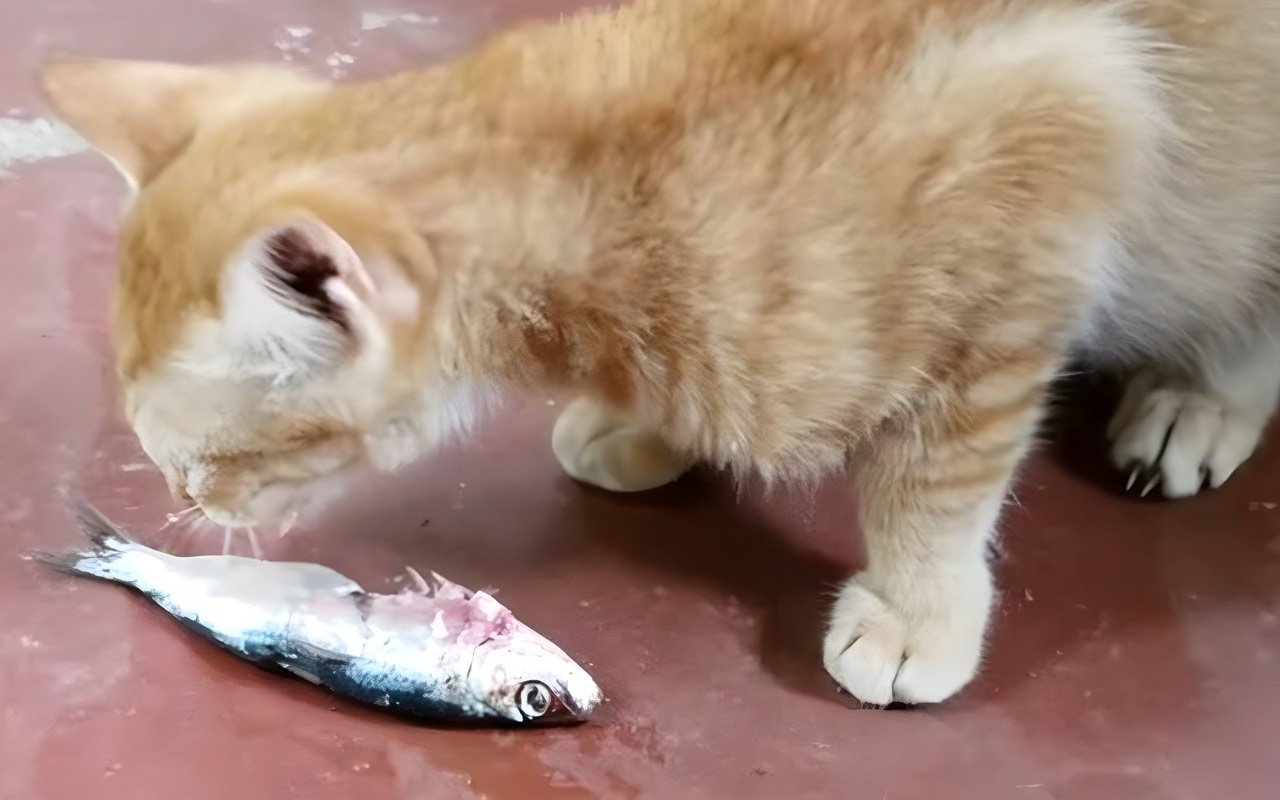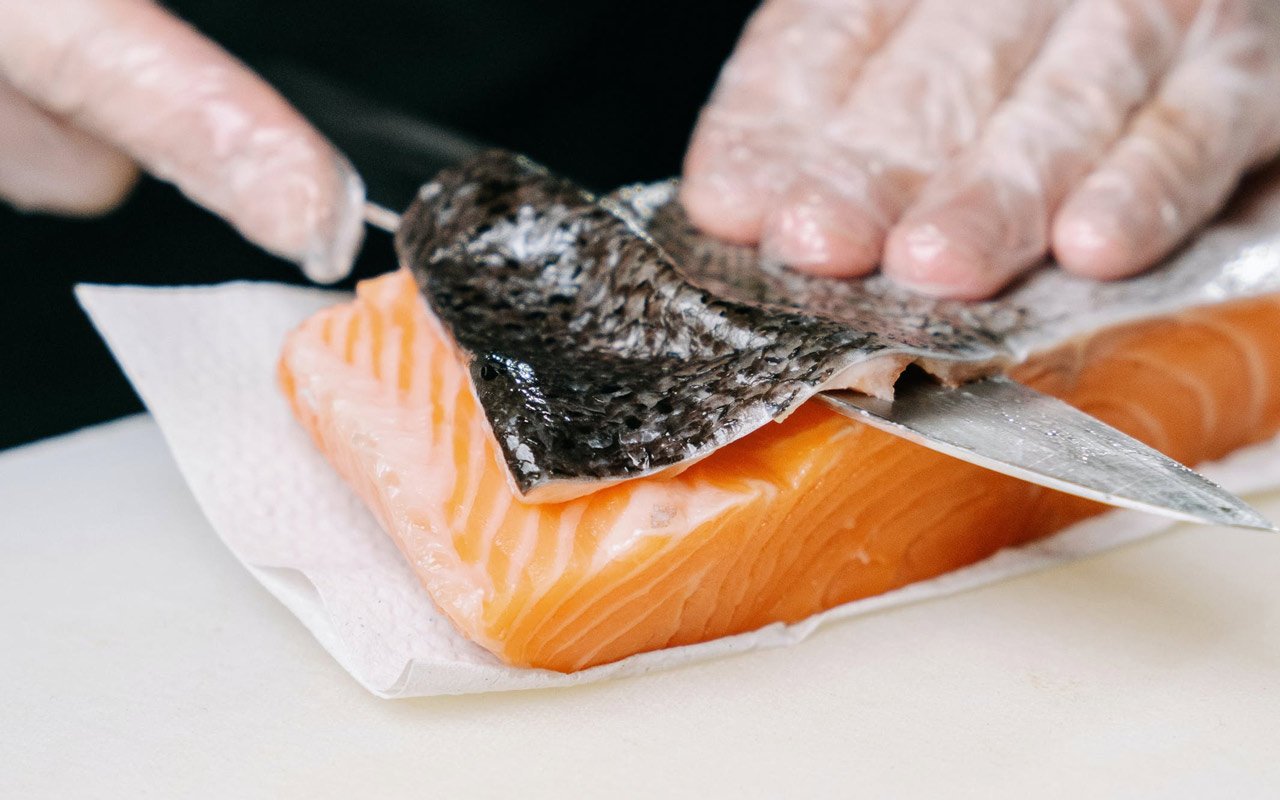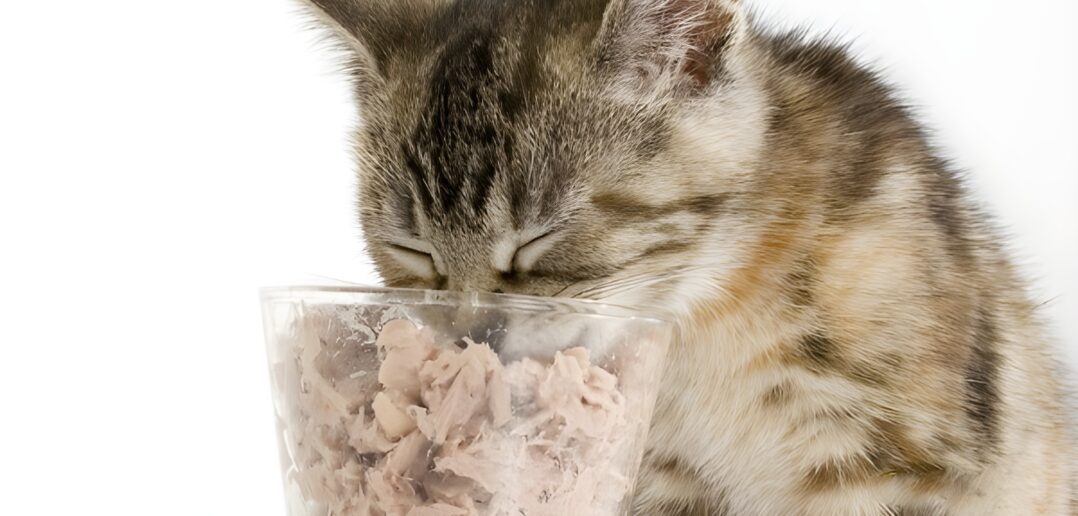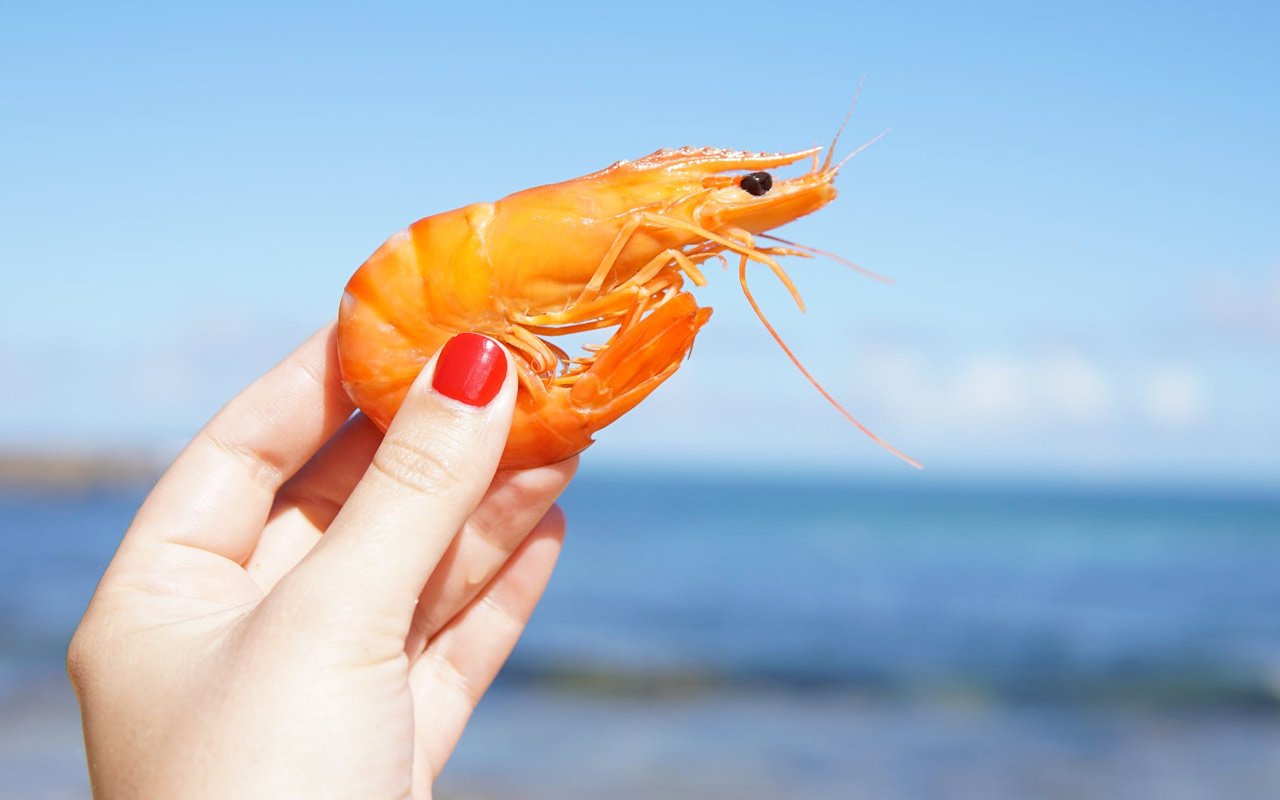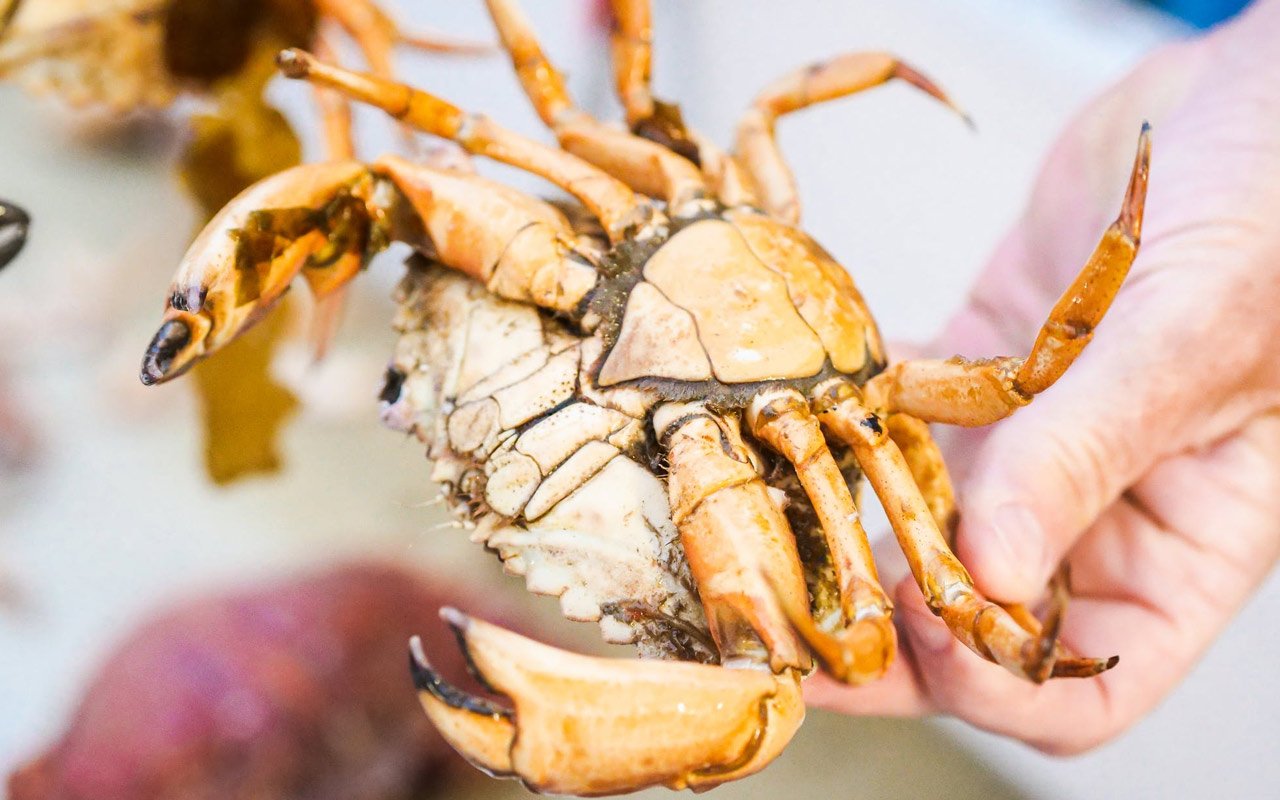If you are a new cat owner, you will certainly have a lot of surprises in caring for and preparing food for your beloved cat. Before giving a cat a new food, most people wonder for fear that it may be harmful to the cat. Can cats eat seafood? Can cats eat shrimp or salmon? Please read this article carefully because Trang will summarize and answer all these questions for you.
Cats are often depicted as fish-obsessed and will go to any lengths to get their fishy treats.
Cats love seafood, including shrimp, oysters, and squid. These foods are rich in important minerals that make up the cat’s red blood cells. These foods are difficult to chew so are best for cats with strong teeth and no picky habits.
These types of seafood are best served cooked to your cat. It can be mixed with rice to make it more cat-friendly. Your cat will enjoy seafood, no matter how it is prepared. You should not give them raw fish, as it can cause problems for their digestive system.
Understanding cats’ needs are one of the most important aspects of cat raising. Understanding what cats eat is key to understanding how to care for them. Gia Han will show you what seafood cats love today.
Table of Contents
Can cats eat fish?
Cats can eat fish. However, care should be taken not to give the cat too much fish and it is best to remove all the bones to prevent the cat from choking. Although a fishy snack can be healthy for cats in many cases, it won’t provide a complete nutritional source of food.
This means that fish is not only good for your cat’s protein needs but also lacks the necessary vitamins and minerals your cat needs to live a healthy life. Cats should enjoy fish as an occasional treat.
We all believe that cats should be fed fishy foods in perpetuity. How scientifically correct is this? Are fish good for cats? Are all kinds of fish okay for cats? Are some fish more nutritious than others?
Although cats aren’t natural fish eaters, fish can be healthy and nutritional for them. Your cat will be fine eating fish unless they have an allergy to seafood or fish.
Remember to feed your cat the highest quality fish possible. Pre-packaged, ready to eat or canned fish that contains salt, preservatives, or other potentially dangerous ingredients should be avoided. It is better to use deboned or boneless fish.
You should not cook fish that you plan to give to your cat in oil, garlic, spices, or with too much oil. For cats, it is best to cook fish in a boiled, baked, or grilled manner.
Your cat will get more nutritional benefits from oily fish like tuna or sardines than from white fish like flounder and hake.
If you have concerns about your cat’s diet, please consult your veterinarian. Do not attempt to treat allergies yourself.
If you want to supplement your cat’s diet with supplements, talk to your veterinarian first. They can recommend the best dosage and brands to use.
Don’t give raw fish to your cat. This can lead to a severe depletion of essential vitamins.
Raw fish is not suitable for cats because it contains an enzyme called Thiaminase which destroys thiamine, an essential B vitamin for your cat. Cats that have too much thiamine might develop severe health problems.
Raw fish, just like humans, is a breeding ground of bacteria that can cause food poisoning in cats. E. coli, salmonella, and other dangerous bacteria can both affect cats and humans.
You might also wonder if your cat can eat sushi. It is not possible, due to the high amount of raw fish. However, this does not mean that you have less to choose from.
Why do cats love fish? Modern domestic cats have developed a fascination for fish over time. Fish are irresistible to cats, from their distinctive smell and movement to their shimmering scales that play with light.
Fish for cats is a wonderful, shiny toy that smells incredibly interesting.
Can cats eat line fish?
What about line fish like cod, flounder, and hake? These fish can be fine for cats, but they should not contain bones or other harmful ingredients. Cats love white fish, whether it’s grilled, baked, or boiled.
These fish do not contain omegas and healthy fish oils, so they aren’t as beneficial for your cat’s nutrition.
Can cats eat salmon?
Sure, cats can eat salmon. However, it should be noted that raw salmon should not be given to cats, and should not be fed too much because it may cause your cat to be poisoned with mercury.
Salmon is a good choice for cats because it contains vitamins that are beneficial to felines. Salmon is a good choice for cats. However, salmon should be cooked properly and not smoked.
Canister salmon is best avoided as it can contain too many salty preservatives and other harmful ingredients that could be dangerous for your cat.
Avoid salmon-based commercial cat food. Commercial cat food that contains salmon is often farm-raised. This means that the fish are frequently exposed to toxic chemicals and pollutants.
To prevent disease spread, the fish are also kept in overcrowded conditions and fed antibiotics.
You can still give your cat salmon treats, but only if you cook it well. You have many options: grilled, poached, or baked salmon.
Mercury poisoning in cats
The Merck Veterinary Manual states that mercury poisoning can be seen in cats as over-excitement and irritability. Mercury poisoning in cats and humans is very rare. A blood test or hair/fur test are usually used to diagnose mercury poisoning in cats.
Can cats eat goldfish?
The normal diet for cats should not include goldfish. Your cat is at too great risk. You have better options than fish that doesn’t contain bones. They also carry a lower risk of transmitting the disease to your cat. You can also cook salmon and sardines, but only in moderation.
If your cat is allergic to any of the ingredients, then it’s unlikely that Goldfish crackers will cause harm or poison. These crackers contain small amounts of fiber and protein, which can be beneficial to cats.
Can cats eat sardines?
Yes, sardines are a nutritious cat food because it provides many essential nutrients for your cat’s immune system. Pilchards and sardines are excellent sources of Omega-3 fatty acid, vitamin B12, as well as protein. Be careful as these fish can cause weight gain and may also contain heavy metals or toxins.
Make sure you cook the sardines before giving your cat some. Avoid smoking sardines and always read the labels if you are using canned varieties. Sardines that have been preserved in brine should be avoided, or at least rinsed well before consumption.
To avoid your cat consuming high-calorie oils, it is important to drain any oily items. Sardines are a good choice, as they don’t contain tomato, onion, or garlic.
Can cats eat anchovies?
Yes, like other saltwater fish, anchovies are also a delicious and nutritious food for cats.
Anchovies are great sources of unsaturated healthy fats for cats. Be careful as these fatty fish can cause weight gain especially if they are preserved in oil. Make sure you drain all oil from canned products that are oil-based. Rinse off as much salt as possible when bringing anchovies.
Anchovies also have a positive aspect: they are lower in the food chain and contain more mercury from ocean pollution.
Is fish bad for cats?
No, on the contrary, fish is very good food for cats. Although cats aren’t natural fish eaters, fish can be healthy and nutritional for them. Your cat will be fine eating fish unless they have an allergy to seafood or fish.
Dried fish is high in protein and safe for cats. Dry fish can be considered safe just like raw fish or meat.
Oily fish such as tuna, salmon, and sardines are a great source of nutrients in your cat’s diet. They’re high in healthy fats like Omega-3 and Omega-6, which are great for cats’ vision and heart health. These fishes can consider as best fish for cats
Can cats eat tuna?
Tuna can become addictive in cats, regardless of whether it is packed for them or for us. Tuna is a good choice for cats if eaten in moderation. Tuna is an ingredient in many commercial cat food products. Tuna is rich in protein and low carbohydrates.
Tuna is also rich in omega-3 essential fatty acids EPA and DHA. This can help with overall skin and coat health and may also be beneficial for inflammatory conditions such as allergies, arthritis, inflammatory bowel diseases, and skin disease.
A steady diet of tuna made for humans can cause malnutrition as it doesn’t contain all the nutrients that cats need. Too much tuna can lead to mercury poisoning.
Although it’s fine to feed your cat small amounts of tuna as a treat or as a supplement to her complete-and-balanced cat food, too much tuna can be harmful.
Tuna by itself is not enough to provide the necessary nutrients for a healthy cat. Cats have very specific nutritional requirements.
The American Association of Feed Control Officials (AAFCO) certifies that high-quality commercial cat food labels contain a statement stating that the product is “completely balanced.”
The complete-and-balanced statement on a cat food label means that the cat will get all the essential nutrients she needs, in the correct balance, as required for that life stage: adult maintenance (for adult cats), growth and reproduction (for kittens and pregnant or nursing females), or all life stages (for all cats, whether kittens or adults).
Tuna is also high in mercury so excessive tuna consumption could lead to mercury poisoning in cats. Mercury poisoning can cause problems with coordination, balance, and walking in cats, although it is rare.
Cats can even love tuna. Tuna can be very tasty and may even taste better than your cat’s regular food.
Tuna can cause cats to resist regular cat food and will eventually become picky eaters. This can lead to unwanted picky eating or feeding problems.
Before you introduce new foods to your cat’s diet, it is a good idea that you consult your veterinarian. You can feed your cat tuna if you have your veterinarian’s approval.
Tuna supplements should not make up more than 10% of your cat’s daily calories. The rest of your cat’s diet (90 percent) should come from high-quality, complete-and-balanced cat food.
Can cats eat shrimp?
Although shrimp can be a delicious snack for your cat, it is not recommended that you give shrimp to your cat as an alternative to a regular meal.
Shrimp can be high in cholesterol and sodium so you should limit the amount of shrimp you give to your cat. Cats are best to eat plain-cooked shrimp (boiled or steamed)
Cats can eat shrimp and prawns. Because they are low in calories and high in protein, shrimp is a great snack option for cats.
They are high in vitamin B12, zinc, copper, and Omega 3. It is important to not make shrimp a regular part of your daily routine, as it can be high in sodium, cholesterol, and other harmful substances.
It is best to prepare shrimp for cats without oil, salt, or seasonings. Pre-packaged and processed shrimp and prawns may contain salt and other ingredients that could be harmful to your cat. It’s best not to give them these items.
If you are giving fresh shrimp to your cat, a friendly suggestion is to remove the digestive tract. It is not safe to eat. It is strongly advised to remove the entire digestive tract as it contains all of the food that a shrimp has eaten before.
Can cats eat crab?
Cats can eat crab, as long as they are able to get the essential nutrients that your cat needs. Keep in mind, however, that you should only feed your cat crab occasionally.
Your cat can eat crab in moderation. Crab is delicious and healthy for cats. Here are the details on how to feed crab to your cat.
Crab shells can also be too hard and splintery when bitten. Consuming crab shells can cause vomiting or even death. Cats can also try to remove the splintered shell by ripping the tissue in their esophagus if the shell is caught in their stomach.
Cats can enjoy crab sticks in moderation. High sodium intake is the biggest problem with crab sticks. One crab stick could quickly exceed or surpass your cat’s daily sodium intake and can be fatal.
High levels of toxins like sodium pyrophosphate or potassium chloride can cause serious health problems in cats.
Crab sticks are junk food for people, and nature is their garbage disposal. If possible, avoid giving crab sticks to your cat.
Imitate crab, like crab sticks can have a high sodium index which helps it mimic the salty taste and texture of the crab. Surimi is a paste of several types of ground-up seafood. It’s a bit like a hotdog made from seafood.
Surimi (or imitation crab) is generally safe for cats. However, it can be toxic to them because it has undergone a lot of processing. Surimi is also very high in carbohydrates, which can be dangerous for cats.
You should enjoy imitation crab in moderation.
Young cats and kittens should not be given imitation crab because their stomachs and diets can be very sensitive. They can become very sick from imitation crab’s artificial colors and preservatives.
Summary
You can find shellfish in your cat’s backyard. They provide a rich source of zinc and iron as well as calcium and other vitamins and minerals. You shouldn’t give these meats to your cat, as with crab. Raw cat meat purchased from the grocery store may cause intestinal upset or even death.
Shrimp, other fish, and Shrimp can all be given to cats if they are properly cleaned and cooked. Cats can eat animal protein very well. Wild cats eat meats, bones, and tendons. If the meat has been cooked and cleaned properly, it shouldn’t pose any problem feeding your cat.
You want to ensure that your cat eats only fresh fish and shellfish, just like other food. Increased sodium can pose a danger to cats and should be closely monitored.
Frequently Asked Questions
Can cats eat mackerel?
Mackerel is delicious and cats love it. It is delicious and healthy for your cat. This healthy fish will give your cat the extra boost she needs.
Can cats eat crawfish?
Crawfish are crustaceans, and cats can eat crustaceans. Be aware of the potential dangers posed by the shells. You should also ensure that they are part of a balanced diet, as crawfish lack some essential minerals for cats (mainly taurine).
Can cats eat oysters?
Oysters should not be eaten by cats in any form. They contain enzymes that can cause cat death. The enzymes in oysters can destroy the cat's thiamine.
Can cats eat mussels?
Because it provides the proper nutrients that cats require in their daily diet, mussels are good for cats. These nutrients include selenium and manganese as well as vitamin B12, vitamin B12, and zinc.
These nutrients are essential for felines to maintain the health of their vital organs. Mussels can be eaten by kitties as a treat, snack, or as part of their daily diet.
Is octopus safe for cats?
Yes, cats can eat octopus. As a treat, kittens should only eat a small amount of cooked octopus. Although the cooked octopus is generally safe for cats, the raw octopus can be dangerous to their health.
Can cats eat squid?
Cats can eat cooked squid if it is small and carefully cut. To ensure safety, we recommend that the squid be very small and carefully cut.
Cats should not eat raw squid. Raw squid can cause food poisoning in cats, as it contains bacteria. Calamari is a better choice than squid in its raw form. You can only feed your cat plain, boiled shrimp.
Can cats eat salmon skin?
Salmon skin can be eaten by cats, provided it is not toxic. They should only be eaten in moderation.
If you are prone to leaving salmon skin behind on your plates, you can give it to your pets rather than throwing it away.
Properly preparing salmon is key. Salmon skin should never be given to kittens under 6 weeks of age. They will need to be fed by their mother until that time.
Your kitten will require a weaning diet that includes gruel and special weaning foods for 2 to 3 weeks. Avoid feeding salmon and salmon skins to your cat until then.
You can feed your pet a small amount of salmon skin after about 10-12 weeks. You should not only feed salmon but also give your kitten special kitten food to meet their nutritional needs.
What kind of fish can cats eat?
Your cat will enjoy grilled, baked, and boiled fish. Your cat will benefit more from oily fish like tuna or sardines, which are rich in healthy fats than white fish like flounder and hake. If you have concerns about your cat’s diet, please consult your veterinarian.
Can cats eat fish bones?
Fishbones are not recommended for cats. Cats can choke on fish bones. For domestic cats who are used to commercial cat food that is softer and easier to digest, this can be especially true.
It doesn't really matter whether the bones have been cooked or not. They can cause intestinal impaction, choking hazards, and internal damage.
The bones can cause more damage to the throat if the cat attempts to regurgitate them. If the bones have been removed, cats can be given fish.
Can cats eat fried fish?
Cats can eat fish cooked in their food. It's a good source of Omega 3 and protein, which aids in neurological development. You can offer small portions of cooked fish as treats, or include small amounts of fish in your usual meals. However, moderation is important when it comes to fish.
Why do cats like fish?
Most cats love fish, which is why we see it in movies, books, and cartoons.
We all know that cats don't like water. They are unlikely to go out and catch their own fish, so it is unlikely they will eat it as part of their normal diet.
It is common to believe that cats love to fish because Ancient Egyptians lured them into their homes with fish. However, in reality, cats are opportunistic feeders and love fish.
Cats love the smell of fish, which is why they are attracted to it.
Can cats have raw salmon?
Cats shouldn't eat raw fish. Raw fish can cause food poisoning in cats due to Salmonella or E.coli. Cats should also avoid raw fish. This enzyme damages thiamine, an important B vitamin for cats.
Do cats like fish?
Cats are carnivores and require a high-protein diet. Fish is a high-quality, tasty source of fat and protein that cats love. Cats love the smell of fish, and their ability to sense it makes it a more attractive meal.
What kind of tuna can cats eat?
You can offer canned tuna to your cat or fresh tuna if you wish. You should only choose canned tuna that is packed in water and not canned tuna in oils or canned tuna with additional salt or flavorings.
Chunk-light tuna is better for cats than albacore which has higher mercury levels. Be aware of other sources of tuna that your cat may be eating. If your cat is eating canned tuna food, you might add more tuna to it.
Fresh tuna tastes best when it is cooked. Raw fish can be dangerous for cats, even though people eat it all the time. Raw fish can pose the same dangers to your cat as to you. Raw fish may contain parasites and bacteria.
Thiaminase is an enzyme found in raw fish. This enzyme can cause thiamine deficiency in cats. Cooking tuna for your cat kills parasites and bacteria, as well as thiaminase.
How much tuna can I give my cat?
Tuna shouldn't be a cat's main course, so it's best to offer it occasionally as a treat. The can of tuna is too large to be consumed in one serving. One teaspoon of tuna at a time and no more than 2-3 times per week is enough for cats. Tuna should not be a major part of your cat's daily diet.

